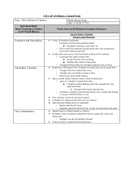Samenvatting
Summary Violence & the brain. Week 6. Lecture and , Week 7. LecturesWeek 8. Lectures
- Instelling
- Universiteit Leiden (UL)
This is a summary of the lectures of week 6, and 7 and 8 of the course Violence and the Brain. The course is part of the minor Violence, which is given at Leiden University. The summary contains explanations on key terms, relationships between discussed topics and important subjects mentioned by th...
[Meer zien]







